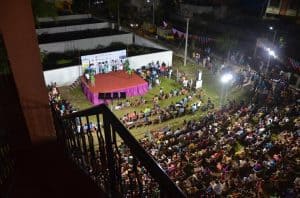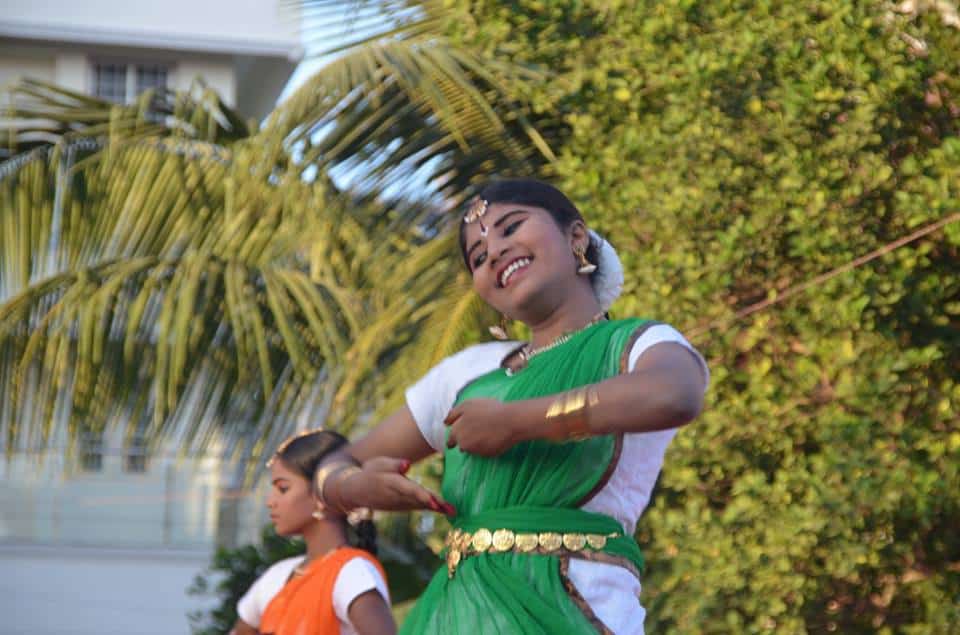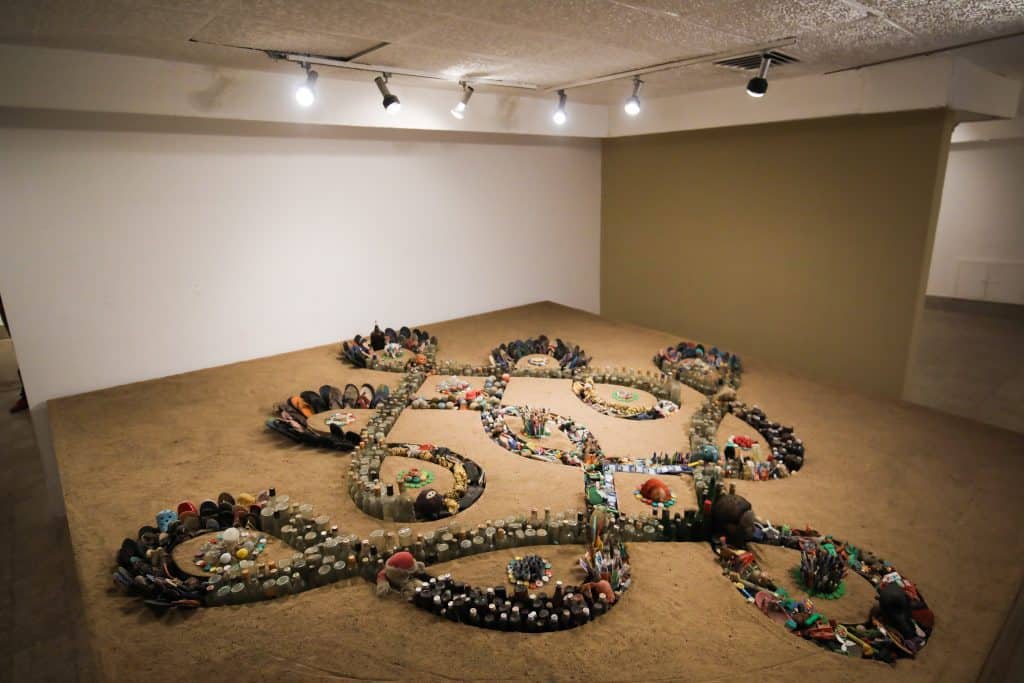The devastating floods of 2015 were a big jolt for Chennai. Since then there have been many conscious efforts in the city to start a dialogue around conservation of the extremely precious, and threatened, natural resource — water. Numerous non-governmental organizations (NGOs), Resident Welfare Associations (RWA), activists and even ordinary citizens have started working towards raising awareness about waterbodies, reclaiming and rejuvenating them.
To discuss the problems surrounding water, OpenAct (a forum to discuss solutions for problems surrounding social entrepreneurship, environment and sustainability) along with Goethe Institut in Chennai on 27 February 2018 hosted the confab as part of the DAMned ART project, primarily to initiate a conversation on water among experts and explore solutions.
In a discussion focusing on how to build consensus among different states and countries to resolve water issues, an artist commented: “Arranging for art exchanges between states and countries can open up doors for solutions. Along with the art, there would be a free exchange of thoughts on resolving the crisis too.”
Supporting the artist, Raj Cherubal, CEO of the Chennai Smart Cities mission added, “There should be competitions built around water and environment challenges.”
This is in fact something that has been observed as an emerging trend in the city, with quite a few novel events and activities organised recently to increase awareness among residents in Chennai about water and celebrate the city’s water bodies and resources.
Celebrating Lakes
In end February, the Perungudi Lake Area Neighbourhood Environment Transformation (PLANET) — one of the pioneers in the field — hosted the third edition of their festival to celebrate the lake. Hordes of residents from Perungudi, and also from other neighborhoods, participated in the day-long celebrations.
Explaining the trigger behind this initiative, Sajeevan Puthirikal, a core member of PLANET, “We began celebrating our lake after the 2015 floods. The objective of organizing a lake festival is to tell people about the presence of the lake amid residential neighbourhoods and its importance.”
The idea is catching on beyond doubt. Breaking the records of the previous edition of the lake festival, around 800 kids of the neighbourhood participated in the drawing contest alone.

Bird’s eye view of the turnout at Perungudi Lake festival that was held on February 24 in Chennai. Pic: PLANET Association Facebook Page
Though not under intense scrutiny, the 57-acre Perungudi Lake had been battling problems such as the release of sewage, open defecation, garbage dumping by passers-by, soaps/detergent pollution due to bathing and cleaning by citizens. However, the association has been tackling each of these problems, one after the other, since 2016. Sewage inflow was stopped in 2016 and the locals have almost stopped using the lake for bathing/washing clothes after the awareness drive in the 2017 lake festival.
“There are some migrant workers living around the lake who defecate in the open, wash clothes in the lake water and bathe with soap. We ask them not to, but they don’t seem to understand. Along with them, the cab drivers of a corporate company wash their cars by the lake with detergents. The used water goes back to the lake, polluting it further. But we will continue to spread information and harp on the importance of curbing such practices through our festivals. We have succeeded in making local residents aware, we will slowly take it up with the drivers and the migrant community too,” said Sajeevan.

Performance of Bharathanatyam by the school kids residing in Perungudi during the lake festival. Pic: PLANET Association Facebook Page
The Environmental Foundation of India (EFI) that has been pioneering lake clean-ups and educating school kids on water since 2007 is also organizing a lake festival in Mudichur on March 17 and 18. Unlike a casual cultural festival, this event would educate the residents of Mudichur and Arasankazhani about the one-and-half-year long clean-up of Arasankazhani Lake.
“The key motive of the festival is to decentralize all the EFI volunteers, motivate and reboot them. We will also be partnering with other NGOs in the city and the local residents to maintain the saplings planted along the lake,” said Vajiravelu of EFI.
The EFI has also taken up other initiatives to create mass awareness, for example organising a Lake Safari free of cost, painting public walls with social messages and organizing quiz contests around environmental themes for school kids in Chennai.
Going artsy
The DAMned ART exhibition that was held between February 2nd and March 4th at the Lalit Kala Akademi chose to take up the issue of water in an arty way. Jointly organized by the Goethe Institut, Chennai and Embrace Our Rivers, the DAMned ART exhibit housed 13 projects of 20 Indian and international artists, along with film screenings, workshops, lectures, music, dance and theatre performances.
The objective of the projects organized by the Institut was to harness the power of art and culture in creating a dialogue on water. The organizers felt that the long-lasting impact an artistic reflection on the issue could create would go much further in arousing and engaging residents, than closed-door lectures or policy discussions would.

Conceptualized by the artist Parvathi Nayar, here is a Kolam, a traditional Indian art, installed with the trash collected along the Adyar estuary at Lalit Kala Akademi as part of the DAMned ART exhibit. Pic: Madras Photo Bloggers
“The DAMned ART project was planned way back in 2015, but we were able to pull it off only in 2018 since the government granted us permission now. The original idea was to install the arts in public spaces but due to some reason, the government did not permit us. And finally we decided to organize this at Lalit Kala Akademi,” said Seema Massot, Project Manager, Goethe Institut.
Since 2016, the Institut has been actively engaged in creating awareness on water in the city. Water mapping, photography exhibitions alongside Chennai Photo Biennale, creation of the Chennai Water Forum and walks for citizens are a few of the major activities initiated and accomplished by the Institut.
Talking about the response received, Seema said, “We have received a tremendous response. We often feel that children cannot interpret such complicated issues, but it has been proved wrong. Since the theme revolved around art, it made easier for children to comprehend the issue too. The downside was the lack of space; had it been organised in a public space, such as by the Cooum, the turnout would’ve been even larger.”
“Moving forward, we shall be launching the ‘Train the Trainers’ programme very shortly. Training would be given to environmentalists, civil society workers and activists in creating awareness about water problems in Chennai. The trainers, in turn, would go around and spread the message to the masses,” she added.
Embracing other public spaces
The Chitlapakkam Rising team, which also participated in the Perungudi Lake festival, hopes to implement something along similar lines. Inspired by them, the team plans to organize gatherings to increase citizen engagement in public spaces in Chitlapakkam. Though the team has taken several initiatives to restore the Chitlapakkam lake, through the citizen-engagement activity, the volunteers try to scrutinize all the public spaces in the locality every weekend.
“We realize that only citizen engagement can result in effective action on problems faced by the city. We plan to kick-start the initiative from March 11; we shall have some cultural activities like singing, drawing and wind up with some gyan on how to maintain and keep our public spaces alive. To make it interactive from the inception, we also let the residents choose the name for this activity, every weekend,” said Sunil Jayaram of Chitlapakkam Risings.
He further added, “Our focus is not going to be the lake alone. Every weekend we plan to gather in different places but of course, the first session begins from the lake. The subsequent sessions may be happening in other places, for instance, we have 36 parks in our locality. This way, we may also gain support from people residing in other streets.”
The various initiatives across the city provide interesting perspectives on how such celebrations and events could raise greater awareness among residents about water conservation and management; at the next level, an aware citizenry can perhaps attract the attention of governing bodies, resulting in positive and effective impact.